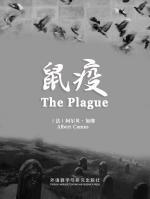Book review
Fight Against the Darkness
Having been
shrouded in the haze of the COVID-19 for a long time, I chose to
open the pages of
The Plague
, with the
thought that I would discover a similar situation. When I finished
reading, not only did I find reflection of the reality in this
masterpiece, but the writing skills adopted and the theme contained
in it also deeply struck me. From symbolization to narrative
technique, from vivid characters to the thought-provoking theme,
every aspect of this book can be called impressive.
To start with, the first step of understanding a book is to figure out the symbols in it. As for The Plague, of course the dominant symbol is the plague. Before the French writer, Albert Camus, begin writing, Paris had been occupied by fascist forces, numerous families had been cut apart, and countless lives had been deprived. Camus decided to reveal the evil of fascist in the form of fables, so he chose the plague, which took humans’ lives just like the fascist, to promote the development of plots, and to express the fear, anxiety, pain and struggle in reality.
Novels can’t avoid being boring and dull sometimes, but the narrative skills adopted by Camus succeeded to make this book readable. On the surface, Camus was just telling a story of people’s daily lives, everything seems so vivid and every character owns distinctive personality so that readers are willing to turn the pages; however, when portraying the picture of the emergence, outbreak and ending of the epidemic, Camus hid the truth between the lines. That’s why we can grasp the essence of this book easily, for the narrative style is relatively acceptable.
Of course, lively characters are indispensable in an excellent novel. As the hero and the hidden narrator, Dr.Rieux totally focused on giving patients a helping hand when the plague broke out, even if his heart ached for his wife who was away from him in a sanatorium and finally died before they could have a reunion, even if the cases of plague appeared one after another and never stopped, even if he had to take the risk of being infected, never did he surrender to the plague. Also, Dr.Rieux’s best friend-Tarrou, who put forward the idea of setting up a volunteer team and spared no efforts to improve the conditions, deeply impressed us with his undying contribution and passion, even though he got sick, and unluckily died in the darkness before dawn, before the plague is beaten. And the old Grand, the young man Rambert, the impassioned priest …everyone who devoted themselves to fight against the plague, left deep impressions inside our heart.
Last but not least, the core of the novel-its theme, deserves our appreciation by heart. It is about a story of fighting against the plague, but under the surface, Camus has observed and explored the complexity of human nature in a desperate situation. On the one hand, a great number of people desire to seize the enjoyment and happiness at present, they show reluctance to help and simply concern about their own feelings; on the other hand, a minority contribute themselves selflessly to fighting against the plague, regardless of their own time, health, happiness and lives. As is mentioned above, the most outstanding two are Dr.Rieux and Tarrou. The former, a responsible doctor, always stays grounded and work day and night, hoping to improve the situation bit by bit; the latter, a man who values heroism, wishes to be a hero and goes all out to fight against the plague which symbolizes evil. Their beliefs differ, but do not contradict with each other, because they all convey the determination to struggle, fight and battle. Just as Tarrou says, “I don't know what's waiting for me or what's going to happen when it's over. At present, there are patients who must be treated. After that, they will think, and I will think. But the most urgent thing now is to treat them. I do what I can to protect them, that's all.” The future can’t be foreseen, but we can do something to better the present, and all we need to do is just spare no efforts to fight. Simultaneously, not only does the plague resembles the fascist forces, but it can symbolize the all kinds of darkness in the world. When shrouded in the haze, we can’t find the light of the dawn, but as long as we hold our feet on earth and step forward, we will eventually reach the destination.
So, just fight against the darkness, and that’s what the writer wants to convey to us. To sum up, The Plague is more than excellent and worth reading more than once.



 京公网安备 11010802032529号
京公网安备 11010802032529号